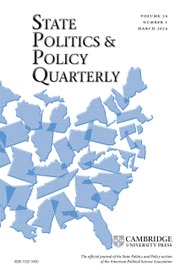Article contents
Partisan Mountains and Molehills: The Geography of U.S. State Intraparty Factionalism
Published online by Cambridge University Press: 25 January 2021
Abstract
We examine whether the geographic distribution of a political party's electoral support affects the divisiveness of statewide primaries. In spite of V.O. Key, Jr.'s (1956) original insight that geography might be a relevant predictor of contested statewide primaries, this hypothesis has received little attention from political scientists. We test Key's hypothesis using data on gubernatorial and U.S. Senate elections to identify the effects of electoral geography on the structure of competition in primary elections. We contend that dispersed bases of electoral support greatly increase the costs associated with maintaining party cohesion. Our findings support the theory that a geographically dispersed electorate heightens the potential for intraparty factionalism. These results are robust across several measures of the dependent variable.
- Type
- Research Article
- Information
- Copyright
- Copyright © 2008 by the Board of Trustees of the University of Illinois
References
- 3
- Cited by


